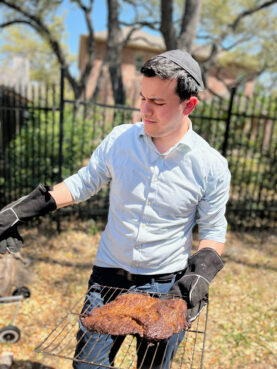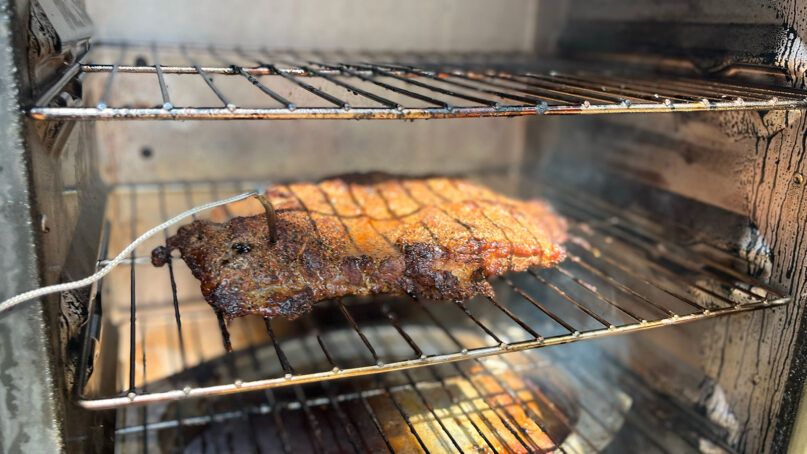(RNS) — When Rabbi Natanel Greenwald learned that a Jew visiting from Los Angeles needed someplace to dine for Shabbat, he extended an invitation to his home, where he was smoking a beef brisket Texas-style — and Talmud-style.
Greenwald, originally from Monsey, New York, is experimenting with a kosher version of the cut that some say defines Texas BBQ.
Greenwald and his family practice Orthodox Judaism and strictly follow the dietary restrictions of their faith that demands certain foods be consumed separately and that every animal bound for the table be slaughtered according to rules set forth in Jewish law.
One of the guests remembered the tale of kosher Texas-style barbecue pioneer Sruli “Izzy” Eidelman. “The story is probably hyped up,” the guest cautioned and then recounted how, before Eidelman opened his popular Crown Heights, Brooklyn, smokehouse (“First kosher smokehouse in the heart of Brooklyn!” according to its website), he toured barbecue pits across Central Texas, ordering Texas barbecue, smelling Texas barbecue and prodding Texas barbecue but, keeping kosher, never tasting Texas barbecue.
RELATED: Faith-based foodies don’t stop at kosher or halal in search of sustainable eating
Greenwald moved to San Antonio to run a young professionals’ organization for the Jewish community at Congregation Rodfei Sholom. He sees barbecue as part of his outreach as a rabbi: Slow-cooked brisket proves to be a valuable means for bringing Jews to his table for Shabbas.
“There’s a lot of Jews in San Antonio,” he reflected, “but not a lot of Judaism.”
Greenwald said he’s not the only Texas rabbi in the city who indulges in the time-consuming process of smoking brisket long and low, with a minimal rub of salt, pepper and paprika. The senior rabbi at his Rodfei Sholom also smokes meat, and he’s heard of other rabbis who have caught the bug. Prior to the pandemic, San Antonio even featured an annual Texas kosher barbecue championship.

Rabbi Natanel Greenwald, a rabbi at Congregation Rodfei Sholom, prepares brisket in his backyard in San Antonio, Texas. Photo by Rabbi Jeffrey Balaban
The chief distinction from regular barbecue is that the animal that provides the beef and chicken (Judaic law prohibits the consumption of pork) comes from a “shochet” — a ritual slaughterer who uses a quick slit of the throat to minimize suffering. After slaughter, the meat requires salting and an inspection certifying that the animal had not suffered from any health issues, such as lesions in the lungs.
To maintain the meat’s kosher status after slaughtering, it must be barbecued in a smoker untainted by non-kosher foods or dairy (Jewish law prohibits mixing dairy and meat).
The other key difference from goyishe barbecue is that the koshering process approximately doubles the price.
Despite the abundance of smokehouses nearby, Greenwald turned to YouTube before smoking his first piece of meat — a chicken — to watch a video of Eidelman at work. Not only was his barbecue in Brooklyn a sensation, but it earned the praise of Daniel Vaughn, the barbecue editor for Texas Monthly. His legend is only surpassed by that of Eidelman’s mentor, Ari White.
Born and raised in El Paso, the devoutly Jewish White founded Gemstone Catering and the Wandering Que food truck in New York City. When he opened a pop-up in 2010, he and his team served about 1,200 people in one day. “I think we ranked as the largest kosher restaurant on Earth that day,” he remembered.
White’s pulled-beef sandwich changed the life of one of his customers, who ordered everything on the menu and then asked White for a job, to which White said no. At that point he said he would come and work for free, and that’s the way it went for 6 months. That customer was Eidelman.
In 2016, White, as one of only two kosher competitors, won the Brisket King of New York City competition. The next year Eidelman, the only kosher competitor that year, pulled off the same feat. He sees his abstinence from tasting non-kosher brisket on his tour of Central Texas as a boon. “Ultimately, that helped me in the long run,” he said: Not knowing what to aim for, he simply aimed for the best taste possible.
White approves the approach. “It’s the simplicity and purity of (Texas barbecue),” White noted, “letting the meat and smoke do the talking.”
For Greenwald, the sheer time it takes to smoke a brisket — 10 hours and more — helps to distinguish the Shabbas meal from other nights. On its own, brisket appealed to the hedonically animalistic part of humankind. “It’s a base desire,” Greenwald explained, “but I’m using it to bring people together to pursue something greater — connection to the spiritual.”
RELATED: The Passover meal has already made room for vegan entrees. Next up? Cell-based meat
Though raised in a family that loved to grill, he is still getting the hang of barbecuing brisket in a smoker. His first attempt, in which he used too low of a flame for the initial cook, failed. His second attempt — well, I was eating it.
How was it? Earlier that week, I ate the best brisket of my life at Pinkertons, a Houston smokehouse with a San Antonio location. Obviously, Greenwald’s second foray could not compete. But as an outreach tool it certainly had an effect. I had come to San Antonio hoping to indulge in meltingly soft meats, to make a final barbecue pilgrimage. Instead, I found myself considering the importance of reserving Shabbat as a sacred day of rest.





